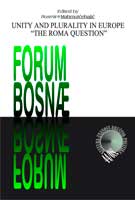FAITH-BASED SOCIAL-ENTREPRENEURSHIP FOR SOCIAL INCLUSION IN EUROPE: INVESTING IN THE FAITH OF YOUNG PEOPLE
FAITH-BASED SOCIAL-ENTREPRENEURSHIP FOR SOCIAL INCLUSION IN EUROPE: INVESTING IN THE FAITH OF YOUNG PEOPLE
Author(s): Ed MarquesSubject(s): Social Sciences
Published by: Međunarodni forum Bosna
Keywords: Laissez-faire multiculturalism; Global Credit Crisis; the “social contract; European Union
Summary/Abstract: Laissez-faire multiculturalism—that is the acceptance of multiculturalism without any serious attempt at the social and economic integration of minority communities—has been Western Europe’s default method of dealing with the social effects that immigration has brought to a changing demographic. The shift of economic power, in labour and industry, away from Europe, has squeezed the job market and presented policy makers with a ripe argument in favour of more stringent ways to deal with immigration. New immigration policies go beyond the usual tough stances on borders and crime and focus more acutely on the issues which surround integration. On one side is the rise in policy aimed at the successful integration of these communities, but, on the other a popular resistance to integration emerges. Inter-communal antagonism emerges, and rising unemployment is usually the first topic raised. The trend towards increasing unemployment has come from the process many refer to as globalisation. Economic forces mean that jobs have shifted away from places where they were before. This reality offers what will be the defining challenges of our time in Europe; how to diversify to create jobs, and how to create unity and prosperity from our diverse and often fractured communities, which are losing core labour providers. Questions of concern to us—religion’s place in the public arena, the state of interfaith relations, the problems that minority religious communities face—do not exist separately from the current social climate. Unemployment, immigration, and that enigmatic force called “globalization” should be of primary concern in thinking about religion in public life. Religion has a central role in identity creation and the way that people carry out their lives, influencing their aspirations and conduct, while also helping to bind immigrant communities. [...]
Journal: Forum Bosnae
- Issue Year: 2008
- Issue No: 44
- Page Range: 113-124
- Page Count: 12
- Language: English
- Content File-PDF

